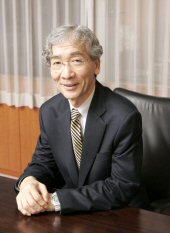Download
Venue
Deutsches Institut für Japanstudien
Jochi Kioizaka Bldg. 2F
7-1 Kioicho, Chiyoda-ku
Tokyo 102-0094, Japan
Tel: 03 – 3222 5198, Fax: 03 – 3222 5420
Access
Registration Info
The lecture will be given in English. It will take place on Thursday, February 15th 2007 at 6.30 p.m. at the DIJ.
Admission is free, space is limited, so please register with Ms. Dinkel at the DIJ.
Japan's Innovation Agendas
February 15, 2007 / 6.30 P.M.
Taizo Yakushiji, Ph.D., Council for Science and Technology Policy, Cabinet Office
 Given that Japan faces aging and labor shortage in the near future, Japan’s future agenda is simply “innovation.” Innovation increases the wealth of a nation through economic realization. This is conventional wisdom. However, unconventional is the fact that it often triggers the decline of a nation. The reasons are four-fold:
Given that Japan faces aging and labor shortage in the near future, Japan’s future agenda is simply “innovation.” Innovation increases the wealth of a nation through economic realization. This is conventional wisdom. However, unconventional is the fact that it often triggers the decline of a nation. The reasons are four-fold:
First, the emergence of contenders, like China. Latent competitors eventually come up when they are successful in technological “emulation”. “Emulation” in this sense implies “copying” plus substantial “improvement.”
Second, “techno-parochialism”. This happens when a nation at the forefront of the innovation race, like Japan today, or the U.S. in the mid 1980s, starts to look only inwards. Parochial pride leads to arrogance, making people forget the very secret of pre-eminence, i.e., the “emulous (innovative) power”.
Third, vulnerability of international technological cooperation. Conventional wisdom has it that technology lends itself to international cooperation. This is a naïve view. In actual fact, innovation is potentially both, cooperative and competitive. The recent alliance of Japanese semiconductor manufacturers against South Korean SAMSUNG is a case in point.
Fourth, economic rationality prevails. Gains in national wealth invite blind belief in economic efficiency. But efficiency taken too far can be an impediment to innovation which is often costly in terms of time and money.
Taizo Yakushiji took his Ph.D. in Political Science at Massachusetts Institute of Technology. Besides his Professorship he is member of the Council for Science and Technology Policy, Cabinet Office and serves as Executive Research Director at the Institute for International Policy Studies.